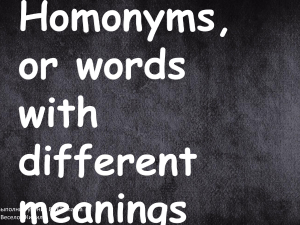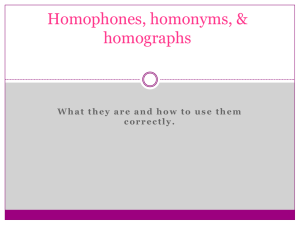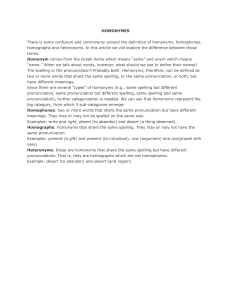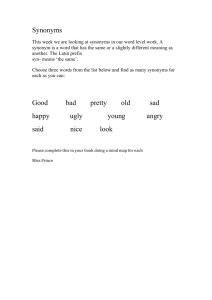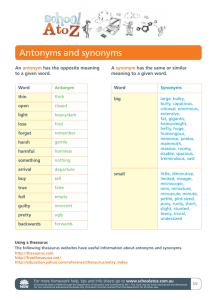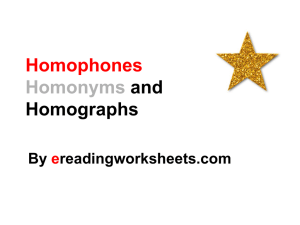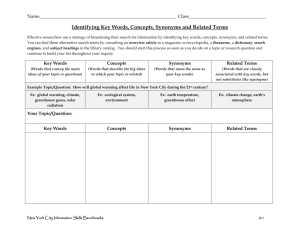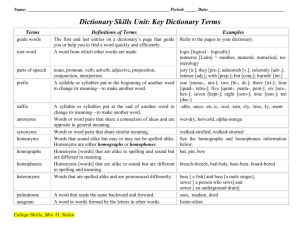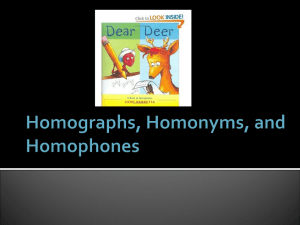Antonyms, Synonyms and Homonyms
advertisement
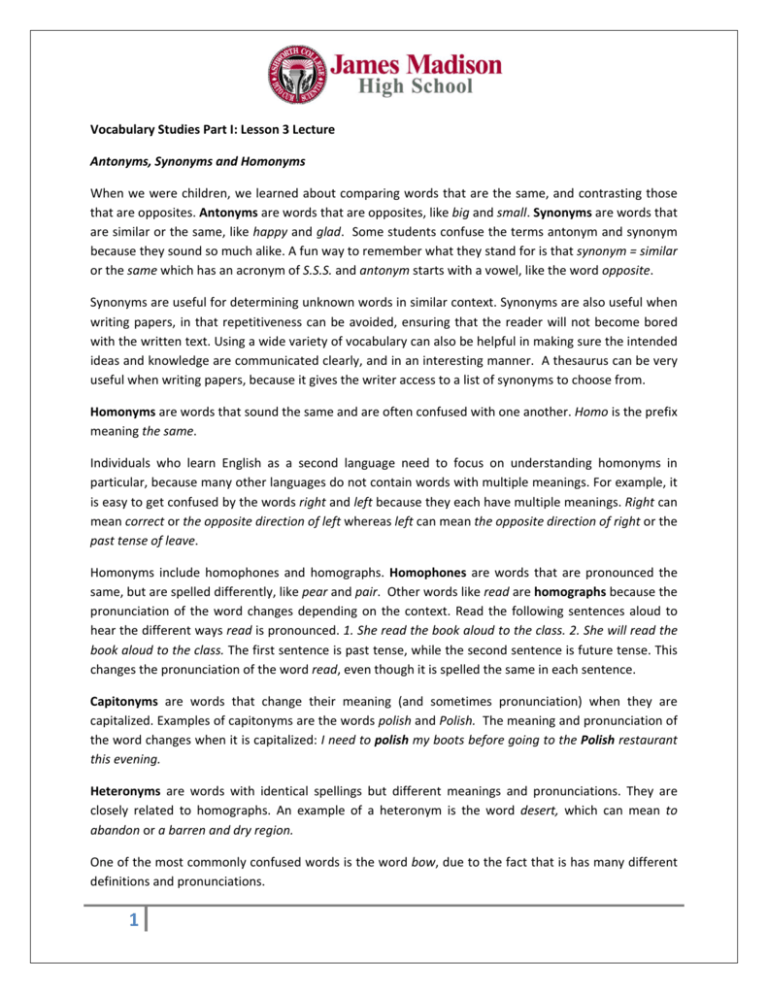
Vocabulary Studies Part I: Lesson 3 Lecture Antonyms, Synonyms and Homonyms When we were children, we learned about comparing words that are the same, and contrasting those that are opposites. Antonyms are words that are opposites, like big and small. Synonyms are words that are similar or the same, like happy and glad. Some students confuse the terms antonym and synonym because they sound so much alike. A fun way to remember what they stand for is that synonym = similar or the same which has an acronym of S.S.S. and antonym starts with a vowel, like the word opposite. Synonyms are useful for determining unknown words in similar context. Synonyms are also useful when writing papers, in that repetitiveness can be avoided, ensuring that the reader will not become bored with the written text. Using a wide variety of vocabulary can also be helpful in making sure the intended ideas and knowledge are communicated clearly, and in an interesting manner. A thesaurus can be very useful when writing papers, because it gives the writer access to a list of synonyms to choose from. Homonyms are words that sound the same and are often confused with one another. Homo is the prefix meaning the same. Individuals who learn English as a second language need to focus on understanding homonyms in particular, because many other languages do not contain words with multiple meanings. For example, it is easy to get confused by the words right and left because they each have multiple meanings. Right can mean correct or the opposite direction of left whereas left can mean the opposite direction of right or the past tense of leave. Homonyms include homophones and homographs. Homophones are words that are pronounced the same, but are spelled differently, like pear and pair. Other words like read are homographs because the pronunciation of the word changes depending on the context. Read the following sentences aloud to hear the different ways read is pronounced. 1. She read the book aloud to the class. 2. She will read the book aloud to the class. The first sentence is past tense, while the second sentence is future tense. This changes the pronunciation of the word read, even though it is spelled the same in each sentence. Capitonyms are words that change their meaning (and sometimes pronunciation) when they are capitalized. Examples of capitonyms are the words polish and Polish. The meaning and pronunciation of the word changes when it is capitalized: I need to polish my boots before going to the Polish restaurant this evening. Heteronyms are words with identical spellings but different meanings and pronunciations. They are closely related to homographs. An example of a heteronym is the word desert, which can mean to abandon or a barren and dry region. One of the most commonly confused words is the word bow, due to the fact that is has many different definitions and pronunciations. 1 Example 1: We know a bow can be used to play the violin. Definition: a long slightly curved stick across which are stretched strands of horsehair, used for playing a violin or related instrument Example 2: We bow to show respect when greeting someone in Korea. Definition: To bend at the waist. Example 3: We used a bow and arrow during the archery sessions. Definition: the weapon used to shoot arrows. Example: She had a beautiful bow on her gift. Definition: a ribbon that is tied. Example: The bow and stern are off limits on his ship to passengers. Definition: The frontend of the ship. Other words that are often confused with bow include bough, bo, beau, and boo. ‐A bough is a branch from a tree. ‐A bo is a long piece of bamboo or wood. ‐A beau is a boyfriend. ‐ Boo is the sound made when you want to scare someone. ‐A boo is slang for a boyfriend or girlfriend. Students of all ages tend to forget to double check the essays they write for incorrect word usage errors, including homonyms. When I was in the ninth grade I wrote a journalism article for our school paper entitled “Everyone is a Winner.” It was a wonderful article, except for one little problem ‐ several times in my article I wrote “Everyone is a Wiener.” It was little embarrassing, and spell check did not catch it 2 because wiener is an actual word (meaning a hot dog). You cannot rely on spell check to catch these types of errors, which is why it is always important to proof your writing before submitting it. Having access to a dictionary and thesaurus is necessary to expand your vocabulary. If you do not have a physical dictionary or thesaurus, there are several great websites such as Dictonary.com that can be utilized to define unknown words. Check out the “WORD Dynam” activity on the website to test your current vocabulary knowledge. Once you have successfully completed this course, you can go back to this activity to see how much your vocabulary has grown! 3
